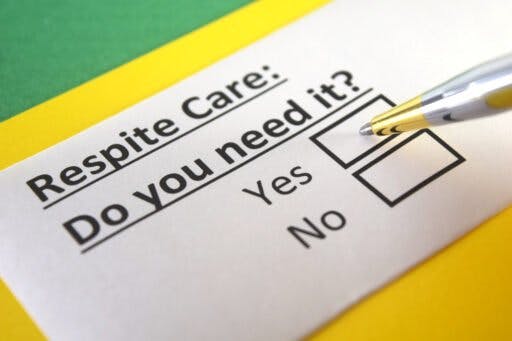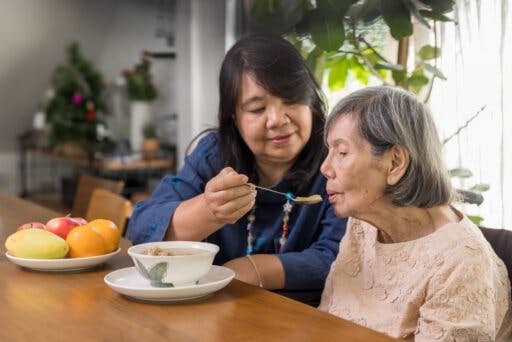When Should Family Caregivers Seek Respite Care?

More than 1 in 5 Americans are currently unpaid caregivers. That means 53 million people are providing care for their aging or disabled loved ones without relief or compensation.
Caring for a family member or relative can be rewarding, but it can also take a huge emotional, physical, and financial toll. For some, juggling a career and caregiving is next to impossible, and many have to choose between continuing to care for a family member and quitting their jobs.
The reality is that caregivers can burn out quickly. The stress can be even more intense for those with multiple family responsibilities.
Luckily, a flexible solution can help prevent burnout: respite care. If you’re a family caregiver, you can seek out respite services and reduce the burden of care that’s on your shoulders.
But, when should family caregivers seek respite care, and what are the signs that you need a break? Read on and learn more about what respite care is, who it can help, and how to choose the best respite care providers for your situation.
What Is Respite Care?
Respite care is a short-term form of care for elderly or disabled people. It provides relief for primary caregivers, who can use the time to get a much-needed break, run errands, go to work, go on vacation, or spend time with other family members.
There is both out-of-home and in-home respite care. For example, out-of-home respite care allows you to bring your elderly family member or friend to a safe environment at a senior living facility while you run a few errands. Then, you can pick them up later and bring them home again.
You can also hire professional staff to come to your home and provide respite care. You might also have informal caregivers, such as friends who care for someone for a short period.
Professional respite care providers usually offer flexible services. They can provide non-medical care, such as 24 Hour Home Care’s companion services and light housekeeping.
Respite care caregiving can also help families for just a few hours, on an as-needed basis. For example, you take your loved one to adult day care centers. Or you can hire help for a few days or several weeks. This type of service gives family caregivers the freedom to rest, unwind, and manage their personal lives while their senior loved ones are cared for.
Who Needs Respite Care?
When seniors become limited due to age-related conditions and struggle to manage their day-to-day tasks, they reach a stage where they can’t live alone without help. When this happens, families might have a meeting and designate one or several caregivers from within their circle of friends and family.
But caregiving responsibilities can take such a massive toll on people, so many families need some sort of outside help. Respite care was designed to provide short-term breaks in these situations.

So at the core of it, respite care serves unpaid caregivers, who, even for a short period of time, need to focus on themselves and their personal lives.
You might need respite care so you can go on a vacation, recover from your own illness or injury, or simply because you’ll be unavailable for other reasons.
Sometimes family caregivers will hire respite services to add a layer of professional care to the work they’re already doing. For example, you might have the energy to help with housekeeping and cooking for your loved one but need someone to handle bathing and grooming or other tasks.
Ultimately, compassionate respite care enables family caregivers to avoid the feelings of guilt associated with being unavailable and maintain peace of mind that their senior is not alone.
Types of Respite Care
There are many forms of respite care. Each type of care has its advantages and disadvantages, so it’s best to understand them all and explore your options before committing to respite care providers.
In-Home Respite Care
In-home respite caregivers provide care and assistance in the patient’s home. A professional caregiver comes to their residence and may offer medical and non-medical care for a few hours, overnight stays, or even full-time for a few days.
The benefits of in-home care are that the patient is comfortable in their own home. They don’t have to leave a place that is familiar to them. This is an important benefit for older adults suffering from memory loss. According to the Alzheimer’s Association, familiarity can help patients feel safer and more at ease.
If the patient needs advanced assistance that requires two people, the respite care provider can send two caregivers. However, this can double the cost of care.
24 Hour Home Care provides this type of non-medical in-home respite care and can help relieve some of the responsibilities of family caregivers.
Adult Day Centers
Another form of respite care is adult daycare. Adult care centers are non-residential facilities that support the elderly or the disabled through health, nutrition, and socialization.
Caregivers can take the patient to the center to participate in various activities and support groups, talk openly about their own feelings, and receive support from staff and other patients.
Before a patient is accepted into such a center, they might have an in-person interview with staff. Once admitted, adult day care services fulfill the medical and non-medical needs of patients. And as they are around other adults, this service can help to prevent feelings of isolation.
For some, the downside of adult daycare centers could be the transportation costs and the hours of care, which aren’t as flexible as they are with in-home respite care services. In addition, in-home respite care can provide similar companionship and socialization to individuals who need it with the bonus of being in the comfort of their surroundings.
Respite Care Facilities
If you’re looking for a more comprehensive care alternative, you can try out respite care facilities. These facilities allow the patient to stay overnight for short or longer periods of time. They receive full care and support from specially-trained staff.
Respite care facilities offer 24/7 care for medical and non-medical needs so patients can feel safe and fully cared for. These facilities provide supervised activities for different needs, which gives patients the chance to socialize and spend time with each other.
Some disadvantages to respite care facilities are that the patient may not feel comfortable in a new environment. And they might feel abandoned if they stay there for extended periods.
If your elderly or disabled family member is considering moving to a more permanent form of intensive care in the future, this could be the right type of respite care facility for their needs. This includes assisted living facilities or nursing homes.
How Does Respite Care Work?
Respite care services help relieve primary caregivers. Respite caregivers work with families to provide tailored services that revolve around the needs of the senior.

Some of the most common respite care services include:
- Personal care for bathing and grooming
- Grocery shopping, meal preparation, and cooking
- Medical care and nursing
- Light housekeeping
- Medication management and reminders
- Socialization and companionship
- Transportation and help with running errands
These services are offered on an hourly, daily, or weekly basis.
Is Respite Care Covered by Medicare or Medicaid?
Respite care might be covered by government programs such as Medicaid or Medicare, as long as the elderly or disabled person fulfills a few criteria.
Medicare will only cover respite care if the patient meets hospice care requirements. This means that the patient must have a terminal diagnosis and has only a few months to live. If the patient is in hospice care, then Medicare can cover temporary respite care up to a certain degree.
Medicaid will cover respite care costs in some states. Because each state is responsible for administering the program, you should check local resources to learn about coverage and requirements.
Another alternative to funding respite care yourself is to use Programs for All-Inclusive Care for the Elderly (PACE). The PACE program covers respite care in some situations. Check with your local PACE office to see whether your loved one qualifies and what documents you should submit to start coverage.
When to Seek Respite Care
Understanding when to find respite services is crucial to avoiding burnout for caregivers.
The Warning Signs
The first step is to understand the warning signs that indicate you might be approaching your limit and starting to burn out. Consider whether you fit in any of these scenarios:
- You feel emotionally exhausted and physically drained.
- You are concerned that no one else will be able to take care of your loved one if you have an emergency.
- You are more agitated and are neglecting your own health needs.
- You are starting to feel resentment toward your senior family member.
- You are experiencing a lack of social activities and feelings of helplessness.
- You are resorting to damaging habits such as smoking, drinking, or gambling.
These are only a few scenarios and feelings you could be experiencing, but if you identified with any of them, then it might be time to consider respite care.
The Benefits of Respite Care for Caregivers
Family caregivers can be stressed and tired since caring for a senior loved one is extremely demanding. Respite care allows family caregivers to focus on their lives and themselves for a short period of time. Some of the main benefits include:
- Time to take a break and enjoy a few hours or stress-free days.
- Peace of mind that your loved one is being cared for without relying entirely on you.
- Time to spend with other family members or friends and enjoy some social activities.
- The opportunity to test a few living facilities for the patient if you are considering long-term placement.
- The ability to regain some sense of self and spend time doing activities you enjoy.
- Mental space to focus on your education, job, or career progression.
The Benefits of Respite Care for Seniors
Family caregivers are not the only people who benefit from respite care. Seniors also gain new experiences and socialization. With the right provider, they can enjoy their time in different facilities or with at-home respite care.
Help from Professional Caregivers
Even though family caregivers learn how to care for patients, assistance from a family member is still no match for professional caregiving services. The patient will experience high-quality care and services tailored to their condition, making their lives easier and more fulfilling.
Socializing with New People
People who have illnesses or chronic conditions may feel socially isolated, especially if they’re homebound most of the time. When they visit an adult day center or start living in a facility, they can socialize with other patients and staff members, making them feel less isolated.
Finding a New Hobby
While spending time with others during respite care, seniors may find new activities or hobbies that they enjoy doing. They can then continue to immerse themselves in these new activities even after respite care services end.
Experiencing Senior Living
Respite care is similar to a trial run for permanent senior living. Patients can experience what it’s like to live in a facility or be cared for by professional staff. This experience allows them to understand whether such a facility or form of care will suit them better in the long run.
How to Choose a Respite Care Provider
Choosing a respite care provider can be challenging. It requires a high level of trust to have someone else care for your loved ones. Here are a few steps you can take to ensure you find a provider that’s a good fit for your family’s needs:
- If your loved one needs medical care, check for the proper licensing.
- Ask for references from friends, colleagues, or other family members.
- Research the agency well to see what services they provide and how their staff is trained.
- Look for reviews online and reach out to other clients who are willing to act as references.
- Have a few interviews or phone calls with an agency before hiring them.
- Try out a day or two of care to see whether the patient feels comfortable in the environment or not.
Taking the time to learn more about a potential agency can help you decide who your next respite care provider should be.
Conclusion
Being a family caregiver can be a demanding job. Depending on your other responsibilities and the needs of your loved one, it can also be exhausting. Respite care is designed to provide some relief for you and professional care for your senior loved one.
If you’re looking for an experienced and trustworthy respite care provider, consider 24 Hour Home Care. We provide personalized caregiver matching so your loved ones experience high-quality care in the comfort of their own home with someone they enjoy being around.
With our compassionate services, you can take a much-needed break whenever you need to. Get in touch to learn more about how we can help you and your loved one with respite care.
